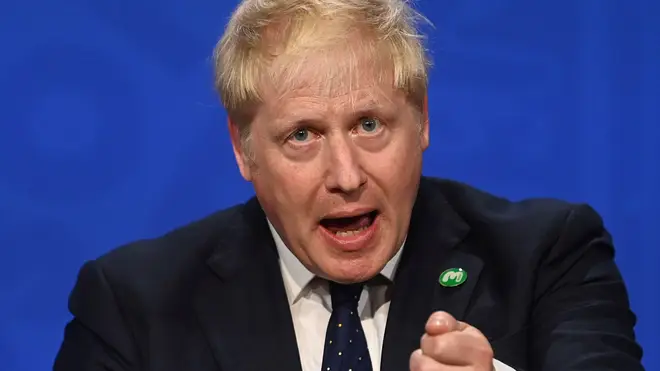
Paul Brand 10am - 12pm
7 September 2021, 17:54 | Updated: 8 September 2021, 10:57

Boris Johnson has defended hiking National Insurance by 1.25% to deal with the NHS's Covid backlog and pay for social care - despite promising not to at the last election. LBC's Political Editor Theo Usherwood analyses why the PM broke a key pledge.
When it came down to it, Boris Johnson had to front his decision to abandon one of his key manifesto commitments in the House of Commons.
The man who once told LBC’s audience to "read my lips", there would be no increases in Income Tax, VAT or National Insurance during the course of this Parliament, has now officially ditched the promise.
National Insurance will go up 1.25% percentage points for both employers and employees. Put another way, if you earn £30,000 a year, you’ll pay a fiver a week more in tax. If you earn £50,000, it equates to a tenner a week.
But today, the Government seems to be quite confident they’ll get the tax hike through the Commons when it comes to a snap vote. As one source put it to me: "This is something Boris always said he would do."
Read more: Boris Johnson refuses to rule out more tax hikes after National Insurance rise

Boris Johnson breaks manifesto pledge and increases National Insurance
Perhaps the biggest question marks are over whether this will actually solve the problems with care for the elderly. One-in-seven end up paying more than £100,000 to be looked after in old age. Meanwhile, those who work in the sector complain of low pay, poor conditions and under-staffing.
But the vast majority of the £36 billion raised with the NICs increase over the next three years will actually be used to get the NHS back on its feet post Covid, starting by clearing the waiting list backlog some fear will hit 13 million without drastic action.
And we will not see any changes for another two years, when finally a cap of £86,000 will come in on the total amount anyone will have to pay for care, whilst the State will step in and support an individual’s care needs once they reach their last £100,000.
Read more: PM announces 1.25% 'manifesto breaking' tax hike to fund social care reform
Read more: Second Tory manifesto pledge broken as pensions triple lock scrapped
Theresa May’s social care reforms (that nearly lost her the 2017 election) actually offered greater protections.
— Theo Usherwood (@theousherwood) September 7, 2021
The so-called floor was solid. Once your savings/assets hit £100k they were protected.
Under this PM’s plan, you only get that safety net for your last £20k.
But that floor is not solid. You will only have partial support down to your last £20,000, at which point the Government will cover the total cost of your care.
Will these measures be enough to solve the crisis in the care? Time will only tell. But at least in the short term, going by the noises, or lack of, from Conservative MPs, these plans actually stand a chance of being implemented in the first place, unlike the strikingly similar proposals put forward by Theresa May in the 2017 Tory election manifesto.